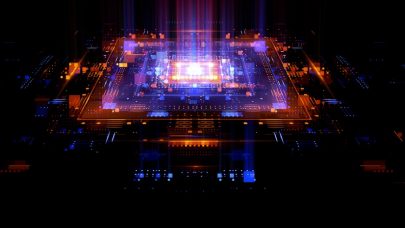Feb. 3, 2022 — The European High Performance Computing Joint Undertaking (EuroHPC JU) has launched 3 new research and innovation projects. The projects aim to bring the EU and its partners in the EuroHPC JU closer to developing independent microprocessor and HPC technology and advance a sovereign European HPC ecosystem. The European Processor Initiative (EPI SGA2), The European PILOT and the European Pilot for Exascale (EUPEX) are interlinked projects and an important milestone towards a more autonomous European supply chain for digital technologies and specifically HPC.
 With joint investments of €140 million from the European Union (EU) and the EuroHPC JU Participating States, the three projects will carry out research and innovation activities to contribute to the overarching goal of securing European autonomy and sovereignty in HPC components and technologies, especially in anticipation of the European exascale supercomputers.
With joint investments of €140 million from the European Union (EU) and the EuroHPC JU Participating States, the three projects will carry out research and innovation activities to contribute to the overarching goal of securing European autonomy and sovereignty in HPC components and technologies, especially in anticipation of the European exascale supercomputers.
The three projects have been selected following two calls for proposals: H2020-JTI-EuroHPC-2020-01 for EUPEX and The European PILOT, and H2020-JTI-EuroHPC-2020-02 for EPI SGA2.
Anders Dam Jensen, the European High Performance Computing Joint Undertaking (EuroHPC JU) Executive Director, said:
“Developing a strong European HPC supply chain with independent components and technologies is key to achieve strategic autonomy and digital sovereignty in Europe. The three projects, EPI 2, EUPEX and The European PILOT are critical to make successful our transition towards exascale while developing a world-class, competitive and innovative supercomputing ecosystem across Europe.”
“The EPI consortium brings together the best industrial and academic expertise in Europe: it combines the best of both worlds, academic innovation with industrial strength. We are thrilled to be given the opportunity to build on the momentum generated by phase 1 of the project and continue to develop the technologies that will power future European exascale systems. We look forward to seeing our components (processors & accelerators) experimented and used – in pilot projects and beyond,” said Etienne Walter, Atos, the EPI Phase 2 General Manager.
“All members of the EUPEX consortium are extremely proud to participate in this pilot for exascale, a project on an unprecedented scale, which is the culmination of more than 10 years of European HPC research and development towards exascale supercomputing. EUPEX will crystallize the research efforts of many projects – from Mont-Blanc projects to DEEP projects – and validate EPI processors with all these European technologies within the framework of a coherent but modular pilot platform. EUPEX will pave the way for a self-reliant European HPC industry, capable of delivering exascale-class supercomputers manufactured in Europe,” said Jean-Robert Bacou, Atos, the EUPEX coordinator.
“The European Pilot project will contribute to a sustainable exascale HPC in Europe and it will help build the groundwork for long-term technical independence. Hardware wise, The European Pilot leverages and significantly scales up EPI advancements built from scratch, such as EPAC, in the form of massively parallel arrangement of HPC vector and machine learning accelerators. These European-IP accelerators and customized software ecosystem will deliver near-exascale levels of performance at unparalleled levels of scale of integration. The European Pilot systems will be deployed in liquid immersion cooling tanks supporting ultra-efficient power densities. The know-how to build these supercomputers will help establish digital autonomy within the EU,” said Carlos Puchol, Barcelona Supercomputing Center (BSC), the European Pilot coordinator.
European Processor Initiative (EPI)
The consortium of the European Processor Initiative (EPI) started the second implementation phase of the initiative on 1 January 2022. The project is implemented under the framework partnership agreement in European low-power microprocessor technologies which focuses on microprocessor technologies to develop competitive European technology for HPC and other applications.
Central goals of the initiative are:
- Strengthening the competitiveness and leadership of European industry and science;
- Developing European microprocessor technology with drastically better performance and power ratios;
- Tackling important segments of broader and/or emerging HPC and Big-Data markets.
The second implementation phase of the EPI will continue the initial developments of the phase 1 on a European microprocessor and accelerator to support European technological autonomy and sovereignty in this critical area. Based on a solid, long-term economic approach, the EPI will deliver central components of future European supercomputers to boost innovation and the digital transformation of the European economy.
The specific focus of the second phase is to finalize the development of the first generation of low-power microprocessor units and accelerators, enhancing existing technologies to target the incoming European Exascale machines, develop the second generation of and ensuring paths for industrialization and commercialization of these technologies.
The microprocessors units are leveraging on Arm architecture, and the accelerators on Risc-V instruction set architecture. The EPI has established close links to two pilots towards the European exascale supercomputers where the developed technology will be demonstrated and made available for software development.
The project is coordinated by Atos (Bull SAS). It will run for 3 years with a budget of up to €70 million provided by the EU and the Participating States of the EuroHPC JU.
European Pilot for Exascale (EUPEX)
EUPEX was launched on 1st January 2022 and will develop the first European platform for HPC, gathering and integrating the full breadth of European technologies, from system architecture, processor, system software and development tools, all the way to applications. The EUPEX platform will be a production-grade prototype designed to be open and scalable, and leveraging the HPC technologies used and developed by its scientific and industrial partners. The pilot system will also serve as a development vehicle for software and applications in collaboration with European key user communities.
EUPEX aims to directly support an emerging and vibrant European entrepreneurial ecosystem around European HPC technology, addressing related sectors such as Artificial Intelligence (AI) and Big Data processing. It will be a vehicle to prepare communities working in HPC, AI and Big Data for the upcoming European Exascale systems and federated HPC infrastructure.
The project is coordinated by Atos (Bull SAS). It will run for 4 years with a budget of up to €40.7 million provided by the EU and the Participating States of the EuroHPC JU. EUPEX is linked to The European PILOT through a collaboration agreement to ensure an aligned evolution of European technology towards the next generation of supercomputers.
Pilot using Independent, Local and Open Technologies (The European PILOT)
From 1 December 2021, The European PILOT project (Pilot using Independent, Local and Open Technologies) started working on designing a European accelerator leveraging and extending developments within the framework partnership agreement in European low-power microprocessor technologies.
Accelerators typically provide most of the nominal floating-point performance in modern HPC systems and represent fundamental building blocks of current and future Exascale HPC systems. The European PILOT will demonstrate an accelerator on the basis of European technology and an open standard using the RISC-V instruction set architecture. The integration of accelerators into a highly dense pilot HPC system with liquid immersion cooling technologies will be an important contribution to the European HPC ecosystem.
The project is coordinated by the Barcelona Supercomputing Center (BSC) and brings together multiple partners to combine existing intellectual property with novel innovation as building blocks for future HPC systems. The project will run for a period of 42 months with a budget of up to €30 million provided by the EU and the Participating States of the EuroHPC JU. The European PILOT is linked to EUPEX through a collaboration agreement to ensure an aligned evolution of European technology towards the next generation of supercomputers.
About the EuroHPC JU
The EuroHPC JU was created in 2018 and recently reviewed by means of Regulation Council Regulation (EU) 2021/1173. 30 European countries are currently taking part in the initiative and pooling their resources with the EU and private partners to enable the EU to become a world leader in supercomputing.
The mission of the EuroHPC JU is to develop, deploy, extend and maintain an integrated world-class supercomputing and data infrastructure in the EU and to develop and support a highly competitive and innovative HPC ecosystem.
Source: EuroHPC JU
































































